St. Francis of Assisi Weekly Reflections
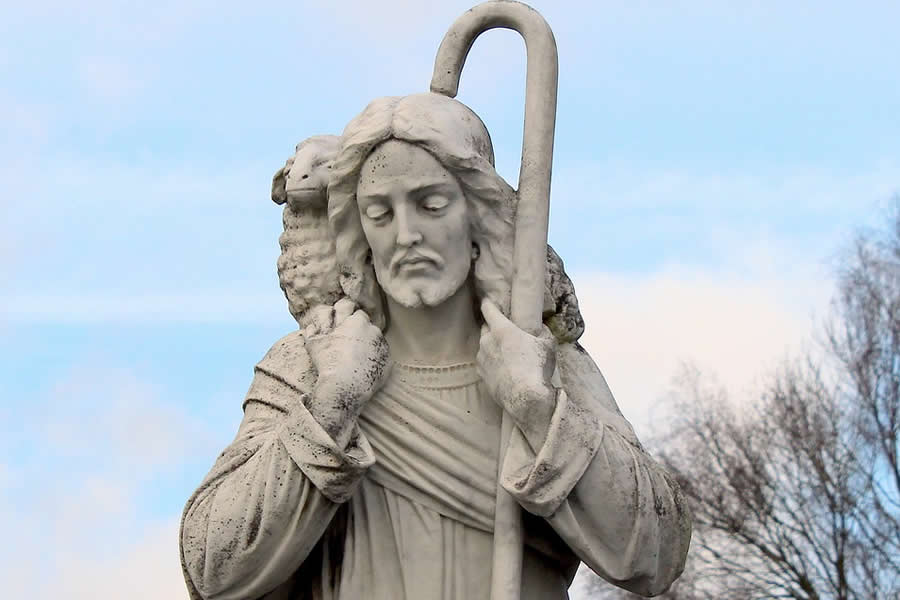
How are You Like the Good Shepherd?
04-25-2021Weekly ReflectionWe Celebrate Worship Resource Vol. 46, No. 2God parents do everything they can to take care of their children. Though they hope it never would be necessary, they would sacrifice their own lives to save their children. If their toddler ran out into the street they would run after them without thinking to save them from danger. Jesus, the Good Shepherd, is the same. While on earth, he lived his life in service of others, ultimately laying down his life to save us from the danger of sin and evil. Unlike a shepherd for hire, who will abandon the sheep if danger arises, Jesus cares for his sheep as a parent cares for their children. Unlike other shepherds who care only for their own sheep, the Good Shepherd regards all God’s children as his sheep, whether they belong to the fold or not. We are children of God, as John wrote in his letter. We share in the power that comes from Jesus, as Peter testified. God calls us each to live our life to serve others, like a good parent, like the Good Shepherd, taking care of others, for all are daughters and sons of the Lord.
How does having the Good Shepherd watching over you reassure you? How can you imitate the Good Shepherd in caring for others?
¿Cómo es Usted Como el Buen Pastor?
Los buenos hacen todo lo posible por cuidar a sus hijos. Aunque esperan que nunca sea necesario, sacrificarían sus vidas ganadas para salvar a sus hijos. Si su niño pequeño salía corriendo a la calle, corría tras ellos sin pensar en salvarlos del peligro. Jesús, lo mismo. Mientras estuvo en la tierra, el Buen Pastor, hace vivió su vida al servicio de los demás, y finalmente entregó su vida para salvarnos del peligro del pecado y el mal. A diferencia de un pastor de alquiler, que abandonará las ovejas si surge el peligro, Jesús cuida de sus ovejas como un padre cuida de sus hijos. A diferencia de otros pastores que solo cuidan de sus propias ovejas, el Buen Pastor considera a todos los hijos de Dios como sus ovejas, pertenezcan o no al redil. Somos hijos de Dios, como escribió Juan en su carta. Compartimos el poder que viene de Jesús, como testificó Pedro. Dios nos llama a cada uno a vivir nuestra vida para servir a los demás, como un buen padre, como el Buen Pastor, cuidando a los demás, a todas las hijas e hijos del Señor.
¿Cómo te tranquiliza tener al Buen Pastor velando por ti? ¿Cómo puedes imitar al Buen Pastor en el cuidado de los demás?
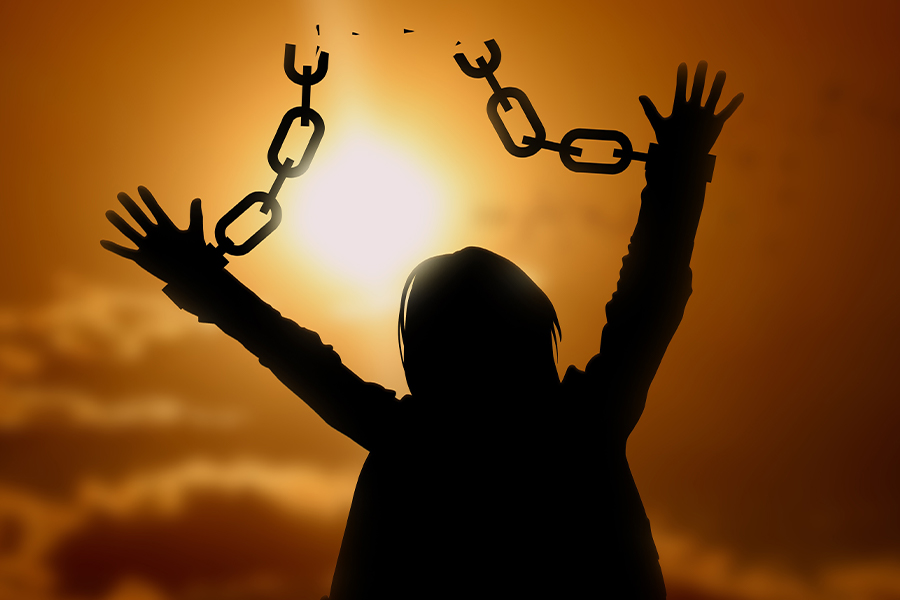
Repent and be Converted
04-18-2021Weekly ReflectionWe Celebrate Worship Resource, Vol. 46, No. 2Jesus gave the disciples work to do in today’s Gospel. He told them “that repentance, for the forgiveness of sins, would be preached in his name to all the nations, beginning from Jerusalem” (Luke 24:47). The disciples, witnesses to this, were to see that this was done. In the first reading, we hear Saint Peter doing exactly that. And he does not shy from confrontation, accusing the people of Jerusalem of being responsible for Jesus’ death, hammering them repeatedly: “you handed (him) over...you denied (him)...you put (him) to death” (Acts 3:13-15). Peter closes by offering them an opportunity for repentance and the assurance of forgiveness, as Jesus asked them to do, as Jesus had effectively offered him. Saint John does the same in the second reading, calling Jesus an advocate on our behalf, having died for the sins of the whole world. We are now those disciples, witnesses in a spiritual sense. Assured of forgiveness, we are called to repent of our sins and share that forgiveness with one another.
For what do you need to repent? Whom should you forgive?
Arrepiéntense y Conviértanse
Jesús les dio una instrucción a los discípulos en el evangelio de hoy. Les dijo “que en su nombre se predicaría la necesidad de volverse a Dios y el perdón de los pecados, comenzando por Jerusalén” (Lucas 24:47). Los discípulos, testigos de esto, verían que esto se hiciera. En la primera lectura, escuchamos a San Pedro haciendo exactamente eso. Y no rehúye la confrontación, acusando a la gente de Jerusalén de ser responsable de la muerte de Jesús, martilleándolos repetidamente: “ustedes lo entregaron...lo negaron...lo mataron” (Hechos 3:13-15). Pedro cierra ofreciéndoles una oportunidad para el arrepentimiento y la seguridad del perdón, como Jesús les pidió que hicieran, como Jesús efectivamente le había ofrecido. San Juan hace lo mismo en la segunda lectura, llamando a Jesús abogado por nosotros, habiendo muerto por los pecados del mundo entero. Ahora somos esos discípulos, testigos en un sentido espiritual. Asegurados del perdón, estamos llamados a arrepentirnos de nuestros pecados y compartir ese perdón unos con otros.
¿Por qué necesitas arrepentirte? ¿A quién debes perdonar?

Blessed are Those Who Have Not Seen and Believe
04-11-2021Weekly ReflectionWe Celebrate Worship Resource, Vol. 46, No. 2Saint Thomas missed more than seeing Jesus in the flesh on that evening of the first day of the week. He also missed Jesus’ gift of the Holy Spirit. Before he died, Jesus promised his disciples that he and the Father would send the Holy Spirit, the “Advocate,” who would guide them to the truth, who would advocate for them before and unbelieving world. Thomas was not there to see the Lord, so he was not there to receive guidance to the truth; he was not there to receive and advocate to overcome his doubt. Each of us received the Holy Spirit in baptism. We are filled with the Spirit, supported by the Advocate. Despite our differences, even among family members or neighbors, we can be one heart and mind in our faith, like the first Christian community. Each of us bears witness to Christ’s resurrection, an event that transforms our lives and gives us the power to transform our world. May the Holy Spirit within us all advocate for the truth, so that, recognizing the risen Lord in each other, we may testify, like Thomas, “My Lord and my God!” (John 20:28)
How do you bear witness to the Resurrection and its effects on your life?
Dichoso los que creen sin haber visto
Santo Tomás se perdió más que ver a Jesús en la carne esa noche del primer día de la semana. También se perdió el don del Espíritu Santo de parte de Jesús. Antes de morir, Jesús prometió a sus discípulos que él y el Padre enviarían al Espíritu Santo, el “Abogado”, que los guiaría a la verdad, que los defendería ante el mundo incrédulo. Tomás no estaba allí para ver al Señor, por lo que no estaba allí para recibir orientación hacia la verdad; no estaba allí para recibir y abogar para superar sus dudas. Cada uno de nosotros recibió el Espíritu Santo en el bautismo. Estamos llenos del Espíritu, apoyados por el Abogado. A pesar de nuestras diferencias, incluso entre familiares o vecinos, podemos ser un solo corazón y una sola mente en nuestra fe, como la primera comunidad cristiana. Cada uno de nosotros da testimonio de la resurrección de Cristo, un evento que transforma nuestras vidas y nos da el poder de transformar nuestro mundo. Que el Espíritu Santo dentro de nosotros abogue por la verdad, para que, reconociendo en los demás al Señor resucitado, testifiquemos, como Tomás, “¡Señor mío y Dios mío! (Juan 20:28)
¿Cómo das testimonio de la resurrección y sus efectos en tu vida?
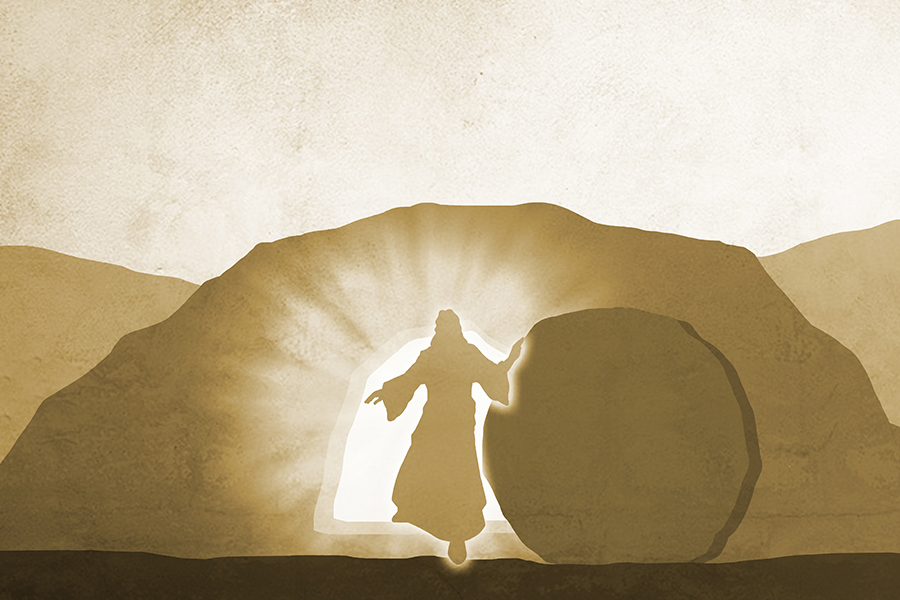
Easter is Just the Beginning... HE LIVES!
04-04-2021Weekly ReflectionWe Celebrate Worship Resource, Vol. 46, No. 2Three people appear in the Easter Gospel: Mary of Magdala, Peter, and the disciple whom Jesus loved, generally regarded as John. Two were present at the foot of the cross on Good Friday. Mary of Magdala comforted Jesus’ mother as Jesus was executed. In some of his last words, Jesus entrusted his mother into John’s care. Now Mary of Magdala purposefully finds John when she saw that the tomb was empty. Though Mary would have been there too, she does not summon her, perhaps not wishing to upset her any further with this news. But she also ran to one other disciple: Peter, who thrice denied knowing him. Peter, who likely wept in shame each subsequent morning when hearing the cock crow. Perhaps he was relieved this morning to have an emergency to distract him from his guilt. Peter, ashamed of his behavior, and John, concerned for his adopted mother, ran as fast as they could to the empty tomb. When they got there, impetuous Peter leapt right in, as reflective John saw and believed. The empty tomb is not the end. Easter is just the beginning. HE LIVES! May Christ rise in us as he did in his closest disciples on that first Easter morn.
How does Christ rise in you on this Easter Sunday?
La Pascua es solo el Comienzo. ¡EL VIVE!
En el evangelio pascual aparecen tres personas: María de Magdala, Pedro y el discípulo a quien Jesús amaba, generalmente considerado como Juan. Dos estuvieron presentes al pie de la cruz el Viernes Santo. María de Magdala consoló a la madre de Jesús cuando Jesús fue ejecutado. En algunas de sus últimas palabras, Jesús confió a su madre al cuidado de Juan. Ahora María de Magdala busca a Juan cuando vio que la tumba estaba vacía. Aunque María también habría estado allí, no la llama, tal vez no deseando molestarla más con esta noticia. Pero también corrió hacia otro discípulo: Pedro, quien tres veces negó conocerlo. Pedro, quien probablemente lloró de vergüenza cada mañana siguiente al escuchar el canto del gallo. Quizás se sintió aliviado esta mañana de tener una emergencia para distraerlo de su culpa. Pedro, avergonzado de su comportamiento, y Juan, preocupado por su madre adoptiva, corrieron tan rápido como pudieron hacia la tumba vacía. Cuando llegaron allí, el impetuoso Pedro entró directamente, el reflexivo de Juan lo vio y creyó. La tumba vacía no es el final. La Pascua es solo el comienzo. ¡EL VIVE! Que Cristo resucite en nosotros como lo hizo en sus discípulos más cercanos en esa primera mañana de Pascua.
¿Cómo resucita Cristo en ti este domingo de Pascua?
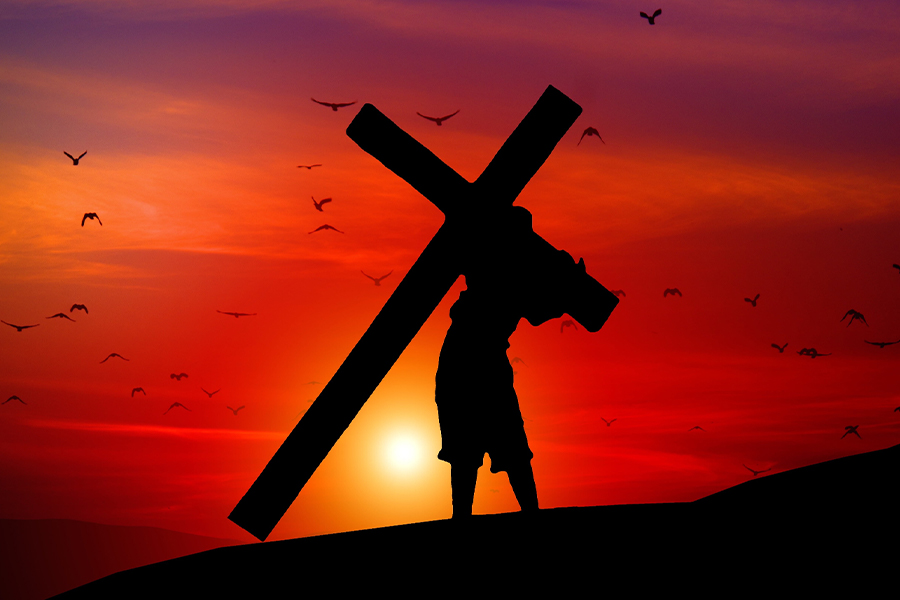
Will You Accompany Him to the Cross?
03-28-2021Weekly ReflectionWe Celebrate Worship Resource, Vol. 46, No. 1When the going gets tough, the tough get going” certainly does not apply to Jesus’ disciples in Mark’s Gospel. Three times Jesus warned them that he would suffer and be put to death, then rise to glory. Each time the disciples made it clear that they did not want to hear that kind of talk. Peter rebuked him, James and John chose to focus on being seated with him in glory, and the other disciples just argued over who was the greatest. Today we hear what happens when they are faced with the cross. Judas betrays him. Peter, James, and John fall asleep as he prays. Peter denies him. One of his followers, who no doubt had once been told to leave everything behind to follow him, literally leaves absolutely everything behind. . . to run away. The going got tough and the disciples fled. Those who honored him when he rode into Jerusalem abandoned him before the cross. Jesus’ disciples were decidedly not heroes; they were flawed human beings. As are we. They made the wrong choices. As do we. But we see Peter break down and weep as soon as he realized he has done exactly what he swore he would not do. This Lent we may have fallen. We may have turned away. Today we pray for the strength to get up, to turn back, to accompany our Lord on the way to the cross. This is the way to which we are called.
How have you let down the Lord? What are you called to do differently?
¿Lo Acompañarás a la Cruz?
Cuandolas cosas se ponen difíciles, los fuertes se lanzan a la carga” ciertamente no se aplica a los discípulos de Jesús en el Evangelio de Marcos. Tres veces Jesús les advirtió que sufriría y moriría, y luego resucitaría a la gloria. Cada vez que los discípulos dejaron en claro que no querían escuchar ese tipo de conversación. Pedro lo reprendió, Santiago y Juan optaron por concentrarse en sentarse con él en la gloria, y los otros discípulos simplemente discutieron sobre quién era el más grande. Hoy escuchamos lo que sucede cuando se enfrentan a la cruz. Judas lo traiciona. Pedro, Santiago y Juan se duermen mientras ora. Pedro lo niega. Uno de sus seguidores, a quien sin duda alguna vez le habían dicho que dejara todo atrás para seguirlo, literalmente deja absolutamente todo atrás. . . pero para huir. Las cosas se pusieron difíciles y los discípulos huyeron. Los que lo honraron cuando entró en Jerusalén lo abandonaron ante la cruz. Los discípulos de Jesús decididamente no eran héroes; eran seres humanos imperfectos. Como somos nosotros. Tomaron decisiones equivocadas. Como nosotros. Pero vemos a Pedro caerse al suelo en llanto tan pronto que se dio cuenta de que había hecho exactamente lo que juró que no haría. Esta Cuaresma puede que nos hayamos caído. Es posible que hayamos huido. Hoy oramos por la fuerza para levantarnos, dar la vuelta, acompañar a nuestro Señor en el camino de la cruz. Esta es la forma a la que estamos llamados.
¿Cómo has defraudado al Señor? ¿A qué estás siendo llamado a hacer de manera diferente?
Love and Betrayal
03-28-2021Question of the WeekReading I: Luke 19:28-40 - Welcomed with Palms
Reading II: Philippians 2:6-11 - Imitating Christ’s Humility
Gospel: Mark 14:1-15:47 - The Passion of Jesus
Key Passage:
He began to curse and to swear, “I do not know this man about whom you are talking.” 14:70
Adults: When have you felt that you betrayed the confidence of another, as Peter did when he denied Jesus?
Kids: When have you let someone down who trusted you? How did you feel?
Amor y Traicion
Lectura I: Lucas 19: 28-40 - Bienvenida con Ramos
Lectura II: Filipenses 2: 6-11 - Imitando la humildad de Cristo
Evangelio: Marcos 14: 1-15: 47 - La Pasión de Jesús
Pasaje Clave:
Comenzó a maldecir y a jurar: “No conozco a ese hombre del que hablan”. 14:70
Adultos: ¿Cuándo has sentido que traicionaste la confianza de otro, como lo hizo Pedro cuando negó a Jesús?
Niños: ¿Cuándo decepcionaste a alguien que confiaba en ti? ¿Cómo te sentiste?

How do Your Bear Fruit for Others?
03-21-2021Weekly ReflectionWe Celebrate Worship Resource, Vol. 46, No. 1Picture a single grain of wheat: small, insubstantial, easily blown away in a stiff breeze. But we know that from a tiny seed a tall stalk of wheat grows. A handful of seeds can produce a strand of wheat, wheat that can be harvested and ground into flour, flour that can be baked to make bread. When Jesus speaks of grains of wheat, he knows his audience will understand their potential. Jesus sacrificed his life to produce the fruit of salvation for humankind. Obedient to his Father's will, he “became the source of eternal salvation for all who obey him” (Hebrews 5:9). Our lives blossom when we become willing to die to self so that we can produce fruit for others. With God’s will imprinted upon our hearts, we are drawn to Jesus and the new covenant he won for us. We make the choice to follow him and to serve him by seeing him and serving him in our neighbor. Then, joined together with each other in faith and purpose, we become a fertile field of wheat: bread for the hungry, richness for the poor, plenty for the needy.
How do you bear fruit for others?
¿Cómo das Fruto a los Demás?
Imagínese un solo grano de trigo: pequeño, insustancial, que se lleva fácilmente con una brisa fuerte. Pero sabemos que de una pequeña semilla crece un alto tallo de trigo. Un puñado de semillas puede producir una masa de trigo, trigo que se puede cosechar y moler para hacer harina, harina que se puede hornear para hacer pan. Cuando Jesús habla de granos de trigo, sabe que su audiencia comprenderá su potencial. Jesús sacrificó su vida para producir el fruto de la salvación de la humanidad. Obedeciendo la voluntad de su Padre, él “llegó a ser fuente de eterna salvación para todos los que le obedecen” (Hebreos 5:9). Nuestras vidas florecen cuando estamos dispuestos a morir a nosotros mismos para poder producir frutos para los demás. Con la voluntad de Dios impresa en nuestros corazones, nos atrae Jesús y el nuevo pacto que ganó para nosotros. Tomamos la decisión de seguirlo y servirlo al verlo y servirlo en nuestro prójimo. Entonces, unidos en la fe y el propósito, nos convertimos en un campo fértil de trigo: pan para los hambrientos, riqueza para los pobres, abundancia para los necesitados.
¿Cómo das fruto a los demás?
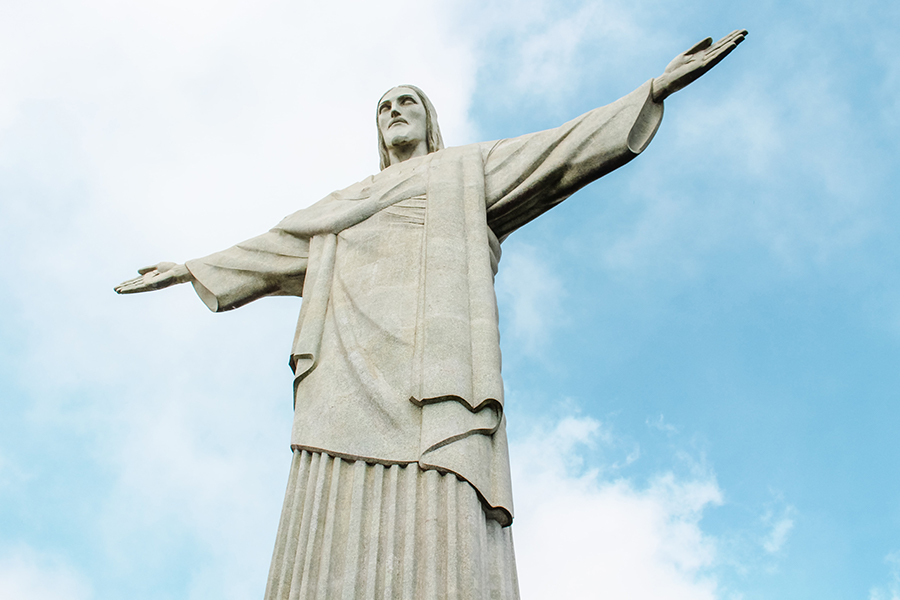
How Does God Lift You Back Up?
03-14-2021Weekly ReflectionWe Celebrate Worship Resource, Vol. 46, No. 1Imagine if Jesus had been sent by God to condemn the world. Some may have thought this after he drove out the money changers and merchants from the temple—the passage we heard last week. Today in the first reading, we hear a condemnation of the unfaithful people who polluted the Lord’s temple. But even though God would have been justified in sending Jesus to condemn humanity for its sinfulness, this is not what God chose to do. God sent the Messiah out of mercy and compassion, so that we “might not perish but might have eternal life” (John 3:16). Jesus reminds Nicodemus of his ancestors’ journey through the Sinai. In the desert filled with venomous snakes, Moses lifted up a bronze serpent that brought life to all who trusted God. To a fallen world God lifts up the Son of Man, bringing life to all who trusted in God. To a fallen world God lifts up the Son of Man, bringing life to all who seek the light. Four weeks into Lent, we likely have had occasions when we have given in to temptation, when we have fallen. But no matter our transgressions we are God’s handiwork. God cares for us so dearly that we are still invited, all invited, always invited, into God’s loving embrace.
How have you fallen this Lent? How does God lift you back up?
¿Cómo te levanta Dios?
Imagínese si Jesús hubiera sido eviado por Dios para condenar al mundo. Algunos pueden haper pensado esto después de que expulsó a los cambistas y comerciantes del templo, en el pasaje que escuchamos la semana pasada. Hoy, en la primera lectura, escuchamos una condenación de las personas infieles que contaminaron el templo del Señor. Pero a pesar de que Dios hubiera sido justificado al enviar a Jesús para condenar a la humanidad por su pecaminosidad, esto no es lo que Dios eligió hacer. Dios envió al Mesías por misericordia y compasión, para que “no perezcamos, sino que tengamos vida eterna” (Juan 3:16). Jesús le recuerda a Nicodemo el viaje de sus antepasados por el Sinaí. En el desierto lleno de serpientes venenosas, Moisés levantó una serpiente de bronce que dio vida a todos los que confiaban en Dios. A un mundo caído, Dios levanta al Hijo del Hombre, trayendo vida a todos los que confían en Dios. A un mundo caído, Dios levanta al Hijo del Hombre y da vida a todos los que buscan la luz. Cuatro semanas después de la Cuaresma, probablemente hemos tenido ocasiones en las que hemos cedido a la tentación, cuando hemos caído. Pero no importa nuestras transgresiones, somos obra de Dios. Dios se preocupa tanto por nosotros que todavía estamos invitados, todos somos invitados, siempre invitados al abrazo amoroso de Dios.
¿Cómo te has caído durante esta Cuaresma? ¿Cómo te levanta Dios?
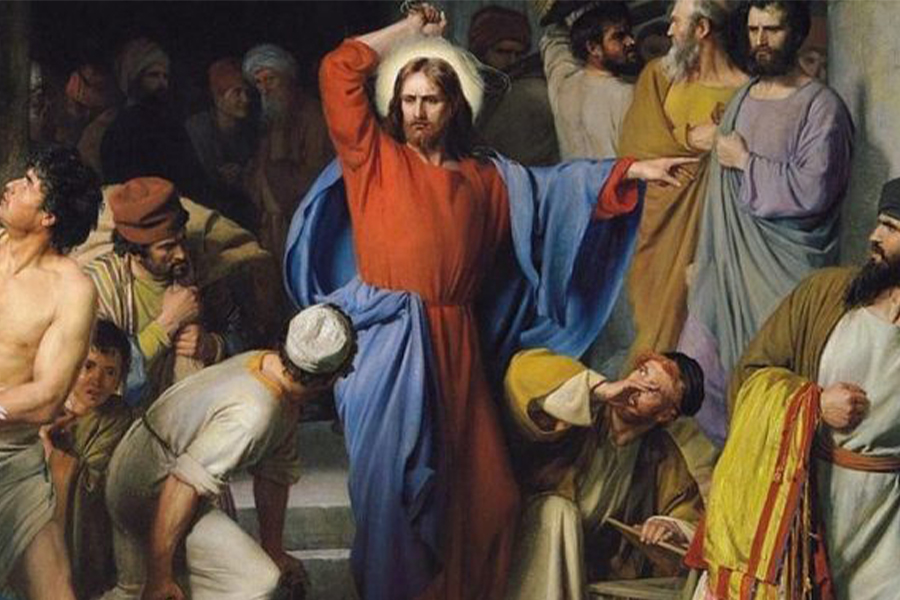
Destroy this Temple and in Three Days I will Raise it Up
03-07-2021Weekly ReflectionWe Celebrate Worship Resource, Vol. 46, No. 1The practice of employing money changers in the temple precincts made sense. With Passover near, many pilgrims traveled for days, counting on paying merchants in the temple area for the animals required to sacrifice. The coins of the Roman Empire bore the image of Caesar or of pagans gods, so money changing was required. But Jesus’ presence puts all this in a new perspective. No need to sacrifice sheep or doves; they are made obsolete by Jesus’ own sacrifice. The temple, the sign of God’s presence here on earth, is supplanted by the presence of God’s own Son. It is not a matter of rejecting the former; it is that Jesus is the fulfillment of each. But Jesus does not present it this way, instead saying things like, “Destroy this temple and in three days I will raise it up,” leading authorities to believe he is insane, or worse, dangerous (John 2:19). His words create a “stumbling block” to believers, horrified by his suggestion, and “foolishness” to outsiders, seeing it as ridiculous 1 Corinthians 1:23). Accepting his cross was neither foolish nor weak, but a sign of wisdom and strength, raising us all up with the promise of defeating sin and death.
What do you do or can you do that looks foolish or weak to others, but expresses the strength and wisdom you have found in Jesus?
Destruyan Este Templo Y en Tres Días Lo Reconstruiré
La práctica de emplear cambitas en los recintos del templo tenía sentido. Con la Pascua cerca, muchos peregrinos viajaron durante días, contando con pagar a los comerciantes en el área del templo por los animales necesarios para el sacrificio. Las monedas del Imperio Romano llevaban la imagen de César o de dioses paganos, por lo que era necesario cambiar dinero. Pero la presencia de Jesús pone todo esto en una nueva perspectiva. No es necesario sacrificar ovejas ni palomas; se vuelven obsoletos por el propio sacrificio de Jesús. El templo, signo de la presencia de Dios en ella en la tierra, es suplantado por la presencia del propio Hijo de Dios. No se trata de rechazar al primero; es que Jesús es el cumplimiento de cada uno. Pero Jesús no lo presenta de esta manera, sino que dice cosas como: “Destruyan este templo y en tres días lo reconstruiré”, lo que lleva a las autoridades a creer que está loco, o peor aún, que es peligroso (Juan 2:19). Sus palabras crean una “piedra de tropiezo” para los creyentes, horrorizados por su sugerencia, y una “locura” para los de afuera, que la ven como ridícula (1 Corintios 1:23). Aceptar su cruz no fue ni tonto ni débil, sino una señal de sabiduría y fuerza, que nos levantó a todos con la promesa de vencer el pecado y la muerte.
¿Qué haces o puedes hacer que a los demás les parezca tonto o débil, pero que exprese la fuerza y la sabiduría que has encontrado en Jesús?